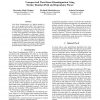Free Online Productivity Tools
i2Speak
i2Symbol
i2OCR
iTex2Img
iWeb2Print
iWeb2Shot
i2Type
iPdf2Split
iPdf2Merge
i2Bopomofo
i2Arabic
i2Style
i2Image
i2PDF
iLatex2Rtf
Sci2ools
AAAI
2015
2015
Unsupervised Word Sense Disambiguation Using Markov Random Field and Dependency Parser
Word Sense Disambiguation is a difficult problem to solve in the unsupervised setting. This is because in this setting inference becomes more dependent on the interplay between different senses in the context due to unavailability of learning resources. Using two basic ideas, sense dependency and selective dependency, we model the WSD problem as a Maximum A Posteriori (MAP) Inference Query on a Markov Random Field (MRF) built using WordNet and Link Parser or Stanford Parser. To the best of our knowledge this combination of dependency and MRF is novel, and our graph-based unsupervised WSD system beats state-of-the-art system on SensEval-2, SensEval-3 and SemEval-2007 English all-words datasets while being over 35 times faster.
| Added | 27 Mar 2016 |
| Updated | 27 Mar 2016 |
| Type | Journal |
| Year | 2015 |
| Where | AAAI |
| Authors | Devendra Singh Chaplot, Pushpak Bhattacharyya, Ashwin Paranjape |
Comments (0)

